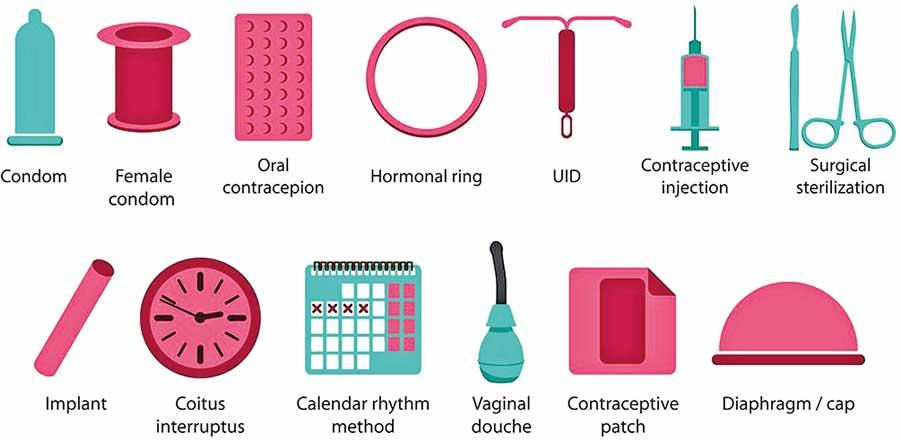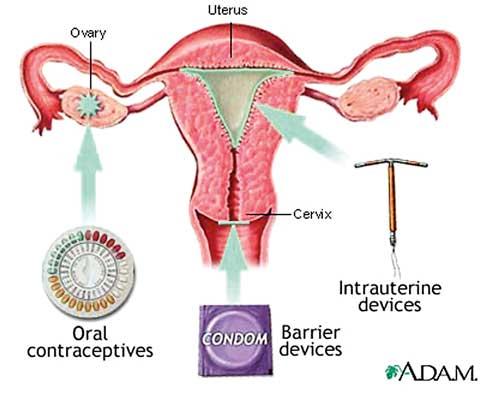11 Oct 2019 - {{hitsCtrl.values.hits}}

 Contraception is not a widely spoken of topic among women and couples. Over 200 million women worldwide would like to avoid a pregnancy, but they are not using an effective method of contraception. The reasons for this vary from country to country. The reasons revolve around the lack of supplies, cultural social beliefs and stigmas and political barriers, poor quality of services and most importantly the lack of education. Since the introduction of contraceptive methods abortions and unwanted pregnancies have dropped drastically around the world. Our resource for this article is Dr. Roshan Zeirideen Zaid who is a Consultant Obstetrician, Gynaecologist, Fertility specialist & Laporoscopic surgeon at Lanka
Contraception is not a widely spoken of topic among women and couples. Over 200 million women worldwide would like to avoid a pregnancy, but they are not using an effective method of contraception. The reasons for this vary from country to country. The reasons revolve around the lack of supplies, cultural social beliefs and stigmas and political barriers, poor quality of services and most importantly the lack of education. Since the introduction of contraceptive methods abortions and unwanted pregnancies have dropped drastically around the world. Our resource for this article is Dr. Roshan Zeirideen Zaid who is a Consultant Obstetrician, Gynaecologist, Fertility specialist & Laporoscopic surgeon at Lanka
Hospitals Narahenpita.
The need for contraception existed from the time the human race existed. Before the invention of pills and condoms women did so many unimaginable things to prevent a pregnancy. In ancient China women drank heated mercury soon after sex. Condoms made of sheep bladder and intestines were used. In ancient Egypt women would rub their genitals with crocodile dung and made vaginal pessaries out of the dung. In the 1960’s young American girls even poured coke into the vagina. The radical, dangerous and exotic list of such methods continues.
What is contraception?
Contraception is a deliberate act or the use of an artificial method or technique of trying to stop a pregnancy as a consequence of sex. Contraception simplified is an attempt to stop pregnancy.

How do contraceptive methods work?
Fertilization occurs when the sperm meets the egg. Different methods work with different principles.The following are contraceptive methods.
1) Barrier – preventing the meeting of sperm and egg
2) Destruction of gamete –sperms (spermicidal)
3) Stopping gamete formation – stopping egg production
4) Stopping the implantation – making the endometrium thin and unfavorable, foreign body preventing implantation
5) Time – having sex when it is impossible for gametes to meet
6) Preventing gamete entry - Withdrawal –sperms prevented from entering the uterus by withdrawal. Sperm stopped from coming out of the testes – vasectomy
7) Interruption of the path – the path gametes would travel to meet each other is interrupted – tubal ligation/clipping.
Why should a woman or a couple use contraception?

How can contraceptive devices be categorized?
What types of contraceptive methods are available?
There are over 15 methods of contraceptives available in the market.
What is emergency contraception?
Methods of contraception used soon after intercourse. There are emergency contraceptive pills (ECP) freely available in the market. Also intra uterine devises (IUD) can be inserted as an emergency contraceptive too. These methods can be used up to 5 days of intercourse but they are more effective the sooner they are used after the act. They are used in unprotected sexual intercourse, fear of failure of the current method used, and
incorrectly using contraception or in sexual assaults.
Is there a way of doing permanent sterilization?
When a woman, man or a couple decides that their family is complete and/or they don’t want to have any more children permanent sterilization if offered. It works more than 99%. It can be an open or laparoscopic surgery in a woman.
The principle of permanent sterilization is occlusion of the fallopian tubes (woman) or the vas deferens (man). Female sterilization can be done using clips, rings, tying and cutting, removing a part of the tube or the whole tube or by damaging the tube using thermal energy. Male sterilization is done as a simple outpatient
procedure under local anesthesia mostly.
Essure is done by hysteroscopy (camera into the womb) by which a spring is screwed into both ostia (where the fallopian tube opens into
the uterus).
Can permanent sterilization be reversed?
Male and female sterilization can be reversed with reasonable success depending on the type of surgery done and the skill of the surgeon.
Is there any contraceptive that is 100% effective?
The answer is no. Even the permanent sterilization is just more than 99% effective. New recanalization of tubes can happen and also very rarely abdominal pregnancies can happen. The only 100% effective method is total abstinence.
How can a woman choose what is good for her?
The choice of a suitable contraceptive method is a difficult decision. It depends on the woman, man, couple, the health care provider, available contraceptive, compliance, education level, medical conditions of the woman, the duration of use, reason to use contraception, how often you have intercourse, your lifestyle, finance and many more. A detailed discussion about the available methods, it’s efficacy, it’s suitability has to be discussed prior to deciding on the method of choice.
Are there any contraindications for contraception use?
There are contraindications depending on the method of use. Some methods will not be suitable if you have certain underlying medical conditions, if you are taking certain medications, if you have certain infections etc. They are specific for the method of use which has to be discussed prior to starting the method. There are medical eligibility criteria for each and every known contraceptive method.
Is breast feeding an effective contraceptive method?
This is called Lactational Amenorrhea Method of birth control, or LAMS. If you are exclusively breast feeding day and night, not started the periods yet and the baby is less than 6 months old it can be98% effective.
When can a woman stop using contraception?
Until a woman reaches menopause she should be on contraception if she doesn’t wish to have a pregnancy. Usually menopause is when the periods completely and permanently cease, around the age of 50yrs.
What complications can occur with the contraception?
Complications too depend on the method of use. Irregular bleeding, gastro intestinal symptoms, bloating, displacements of the device, thrombosis are some of them.
Where can I get contraception from?
The Family Planning Association (FPA), general physicians or a gynaecologist will be able to help you out.
Are there any contraceptive pills for men?
Many researches are working hard, but there are no pills yet.
What are the contraceptive methods available here?
Oral and injectable hormones, male condoms, Mirena IUS, Cu IUD, male and female sterilization methods
Women and also the couple should have the right and choice to decide when to have a baby. And even more women should have the choice to decide the frequency of periods. But these choices are not exercised by women or couples.
21 Dec 2024 21 Dec 2024
21 Dec 2024 21 Dec 2024
21 Dec 2024 21 Dec 2024
21 Dec 2024 21 Dec 2024
21 Dec 2024 21 Dec 2024